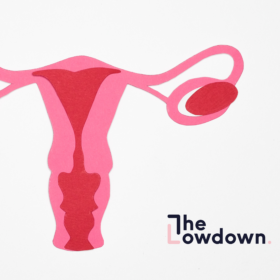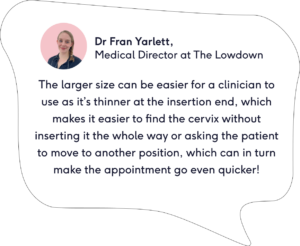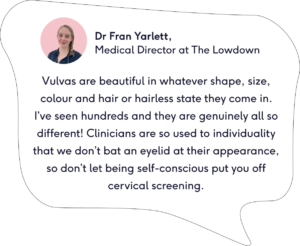
What is cervical screening? Your questions answered
In this article
What's the lowdown?
Cervical screening is not a test for cervical cancer. Screening aims to prevent cervical cancer by looking for high-risk HPV. High-risk HPV can cause cervical cell changes which over a long time can develop into cervical cancer
Having a HPV positive result does not mean that you have, or will develop, cervical cancer
Lots of us worry that screening will be painful, but 70% of those surveyed by The Lowdown experienced no pain or only slight discomfort
There are lots of ways to make your cervical screening appointment as comfortable as possible. Talk to your clinician about any worries you may have about screening so they can accommodate any needs you may have and provide the best care possible
In partnership with the NHS, The Lowdown have created a myth busting guide to cervical screening, complete with answers to the questions you might be more embarrassed to ask before your appointment
Firstly, what is cervical screening?
Lots of people think that cervical screening is a test for cervical cancer, but let’s get one thing straight: it’s not! Cervical screening (which used to be known as a smear test) is a quick test to check on the health of your cervix by looking for certain strains of a common virus called human papillomavirus (HPV)¹. If you want to learn more about what HPV is and how it’s passed on, check out our HPV FAQs blog.
What does cervical screening test for?
Cervical screening works to prevent cervical cancer by checking for the types of HPV that may lead to cancer.
There are over 200 types (or ‘strains’) of HPV, generally categorised into ‘high-risk HPV’ and ‘low-risk HPV’. 8 in 10 people will have HPV at some point in their life², and it usually clears up on its own within 2 years³ without causing any issues. High-risk HPV can cause cell changes over time, which may lead to cervical cancer. If high-risk HPV is detected it means keeping a closer eye on your cervix to spot any changes early, through additional screening or colposcopy, in order to prevent cervical cancer from ever developing.
Out of 100 people having cervical screening, 87 are HPV negative and are invited back for routine screening in 3 or 5 years’ time. Of the 13 who receive a HPV positive result, 9 are invited back for a screening in 12 months time, and only 4 are referred for a colposcopy⁴. A colposcopy is an in-detail examination of your cervix which is usually performed in an outpatient gynaecology clinic.
Remember: having HPV does not mean that you have, or will develop, cervical cancer.
How is cervical screening done?
In England, screening is offered to women and people with a cervix aged 25 – 64. You should get your first invitation just before you turn 25. If you’re aged 25 – 49, you will be invited for a screening every 3 years in England and Wales and every 5 years in Scotland, and if you’re aged 50 – 64, you’re invited back every 5 years.
All eligible people who are registered with a GP practice as female will automatically receive an invitation by post. Trans men who were assigned female at birth won’t receive an invitation if registered with a GP practice as male. So if this is you, you are still entitled to screening if you have a cervix! Please chat with your GP as it is an important part of your ongoing healthcare.
How often is cervical screening done?
- Outcome 1: Your results are HPV negative (i.e. no high-risk HPV). You’ll be invited back for your next screening in 3 years (ages 25-49 in England and Wales) or 5 years ( ages 25-49 in Scotland and ages 50-64)
- Outcome 2: Your results are HPV positive, but NO cervical cell changes. You’ll be invited back for your next screening in 12 months. If you get a HPV positive result with no cell changes 3 times in a row, you’ll then be invited for a colposcopy
- Outcome 3: Your results are HPV positive with cervical cell changes. You’ll be invited for further tests at a colposcopy
Why is the cervical screening age 25?
Even though cervical screening is routinely offered to 25 – 64 year olds, your first invitation letter should actually arrive 6 months before your 25th birthday. You don’t need to wait until you’re 25 to book your appointment.
The reason that under 25s are not routinely offered screening is because cervical cancer is very rare in under 25s. In the UK, per 100,000 women only around 4 people are diagnosed with cervical cancer under the age of 25, which is less than 1% of cases, and there is an average of 0 deaths from cervical cancer among under 25s⁵.
Research suggests that the risks of offering cervical screening to under 25s outweigh the benefits, as it’s common to have changes in cervical cells when you are under 25, which usually clear up on their own6.
If you’re under 25 and are experiencing bleeding between periods, during or after sex; or any changes to vaginal discharge, speak to a healthcare professional as these could be symptoms of cervical cancer. They could also be symptoms of other conditions or STIs, so don’t panic!
What stops people from going for cervical screening?
The Lowdown surveyed 1,171 women and people with a cervix across a range of age groups and asked them about their cervical screening experiences. We wanted to find out why some delay or put off going for cervical screening, whether they find the appointments painful or uncomfortable, and what advice they would give to others who are putting off their appointment. Here’s what we found…
415 people answered the question, ‘If you’ve put off or delayed getting a smear test before, what are the main reason(s) why?’. The top three barriers were:
- Worried about pain or discomfort (39%)
- Worried about embarrassment or taking their clothes off (28%)
- Forgot about it (24%)
Does cervical screening hurt?
1,130 people answered the question, ‘Have you found any of your smear tests painful or uncomfortable?’. They said:
- Not painful, better than expected (11%)
- It was fine (20%)
- Somewhat uncomfortable (39%)
- A little painful (18%)
- Very painful (9%)
You told us that being worried about pain or discomfort was the top barrier to delaying your appointment, so let’s bust some common myths about cervical screening. Plus, answers to a few questions we know can be embarrassing to ask, but you really want to know before going for your appointment.
We’ve also asked our community for their advice on making the experience as smooth as possible, as well as guidance from the experts on the other end of the speculum.
“The most uncomfortable part of the examination is definitely the speculum, no one likes having a speculum inserted into their vagina. I barely felt the swab go in. The process itself took maybe 5 minutes in total and I was off for the rest of the day. While no one wants to do a cervical smear, it is so important and essential its not worth missing.” – Dr Fatema Dawoodbhoy
Tips to make your cervical screening appointment as comfortable as possible
You can ask for a smaller (or larger) speculum
Asking for a smaller speculum is common practice, but lots of us aren’t aware you can ask for one, or even that speculums come in different sizes! We like to think of this as a quick hack to make your screening more comfortable if you need it, and just knowing that you can opt for a smaller size may already help you feel more comfortable going into your appointment room. If you’re well accustomed to asking for a smaller speculum, communicate this with your healthcare practitioner doing the screening right off the bat. You can even ask to insert the speculum yourself if this will make you feel more comfortable and relaxed.
Alternatively, you may even want to ask for a bigger speculum – now, bare with us here. The Lowdown’s Medical Director Dr Fran says:

You can lie down in a different position
Sometimes, adjusting the way you lie down for your cervical screening makes all the difference – for both you and your clinician.
- Usually, you’ll be asked to bring your feet up towards your bum, placing your feet together and turned in, then dropping your legs to the side
- If you have a ‘tilted’ cervix, you can make a fist with both hands, place them under your bum and sit on top of them to lift your cervix up
- Alternatively, you may be able to lie on your left hand side and pull your right leg up towards your chest. This is called the “left lateral” position but not all practitioners have been trained to do this so may not feel comfortable trying it
You can ask for a female healthcare practitioner
While some of us aren’t bothered about who performs our screening, others may feel more comfortable if the person taking the sample also has a cervix themselves. It’s totally okay to request a female clinician if that will make you more comfortable, you won’t be offending anyone! There’s a whole host of reasons for this, which you can choose to disclose, or not. Ultimately, your comfort is the top priority in order to have a successful screening.
Can you have a cervical screening examination when pregnant?
Usually the practice staff should check where you will be in your menstrual cycle when you call to make a screening appointment. If you’ve been invited and you know you’re due on, you may want to book in for another time. Screening can be done at any time during your menstrual cycle, however the best time to go is mid cycle. Generally, you want to avoid having it done when you will be on your period7 as blood can affect the sample and make it less accurate. If your bleeding is light, your practitioner may still be happy to go ahead, otherwise it’s best to reschedule.
You can ask them to stop at any time
Overall, the best piece of advice we can give when it comes to cervical screening is to communicate openly with the person who will be examining you about any nerves or previous experiences you’ve had during screening that you weren’t comfortable with. This doesn’t mean that you have to divulge intimate details of past trauma or personal information. Letting them know that being touched in your genital area, or being touched in general, makes you anxious will allow your clinician to provide you with the best possible care. You can also request that the practitioner asks you for permission before touching you, or ask them to explain what they are doing as they go along.
How to tackle feeling self conscious
Something we found that stops a lot of people from attending their cervical screening appointments is fear of judgement, or being self-conscious about their vulva. The Lowdown’s Dr Fran wants to remind you that you have nothing to be worried about. She says:

At The Lowdown we often have a giggle about the fact that we hide our underwear in the heap of clothes on the chair when we go for our screenings, as if someone isn’t about to come face to face with our vulva. Just remember that the person examining you is a professional – you don’t need to shave or wax if you don’t want to, or apply any scented washes for their sake (you should generally avoid doing this anyway!). They got into this job to help people, not to become a judge for Vulva Of The Year.
Bring some home comforts
If only bringing your duvet everywhere with you wasn’t so impractical and generally frowned upon, eh? While you may not be able to bring all of your creature comforts to your appointment, a few simple pleasures can go a long way to help you feel more at ease and even distracted if need be. We recommend…
- Listening to your favourite music or podcast (double up with some breathing techniques and you will be transported to your happy place)
- Wear some warm socks, or a long skirt or top you can pull up to keep you warm and make you feel less exposed
- Bring a friend or family member with you to calm your nerves and help advocate your needs
- A hot water bottle or a heat pad can help relax your muscles, meaning your pelvic and vaginal muscles will also be more relaxed for a speculum to be inserted
I’ve never had sex – can a virgin do cervical screening?
If you have a cervix and have had any kind of sexual or skin-to-skin contact with the genital area, you could get HPV and it’s recommended that you still attend cervical screening. If you’ve never had any kind of sexual contact, you may decide not to go for cervical screening when you are invited, but you can still attend if you want one.
Our survey also highlighted that a few people have experienced misinformation, either from friends, the internet or even medical professionals, that going for a screening will break their hymen and ‘take their virginity’. Firstly, virginity is a social construct, and whether you are a ‘virgin’ or not does not determine your worth or mean that you should be denied vital healthcare involving cervical examination. Secondly, speculums should not cause any ‘damage’ (for want of a better word) to your hymen when used correctly. As we said earlier, you can always ask for the smallest size speculum if you’re nervous. It’s extremely common to feel this way, particularly if you’ve never experienced any kind of vaginal penetration.
What happens during a cervical screening appointment?
You will be invited into a treatment room by a healthcare professional. They will explain what happens during the visit and answer any questions you might have before they continue. There is no need to shave before your appointment. Your healthcare professional will ask you to remove your underwear and trousers/skirt. They will provide you with a towel or large piece of tissue to cover your genitals. You will be asked to put your heels together, and pull it towards your bottom and then to open your legs. The professional will insert a speculum (covered in lube) so they can visualise your cervix before introducing a small swab which they will glide around the entrance of your cervix to collect cells. The speculum will be removed and you will be given some tissue to clean up the gel. And that’s all, you’re ready to continue with your day!
I’ve had the HPV vaccine – do I still need to go for cervical screening?
The NHS offers the HPV vaccination to children aged 12 and 13 at school in Year 8, and up to 25 years old through GP practices for those who may have missed vaccination in school. The vaccine protects against the most common types of HPV, but not every strain, so even if you’ve had the vaccine, it’s still important to go for cervical screening. The HPV vaccination, cervical screening and treatment for cell changes can all help prevent cervical cancer.
Can you have sex before or after cervical screening?
Having sex before cervical screening is not recommended, at least 24 hours before, as it can cause the cells of your cervix to become irritated and inflamed. Good news is, you can have sex after cervical screening as the cells needed for testing have been collected at that point.
Can cervical screening detect STIs?
Cervical screening is not a substitute or an alternative to STI testing. If you want to test for any STIs, the best place to go is to your local sexual health clinic. They will not only check for any infections present but can also offer you treatment at the same time.
Words of wisdom from The Lowdown community
Don’t just take our word for it, here’s a few top tips from a few seasoned cervical screening veterans who took our survey…
“Talk to your nurse! They will understand! I wore a skirt as I was uncomfortable with the idea of getting undressed and that helped heaps. My nurse also said I could listen to music if I needed to so that might help!”
“GO! The person doing your screen does not give a damn what your genitals look like. And you don’t need to hide your knickers! Also – ALWAYS ask for more tissue and have a panty liner for afterwards, and never feel uncomfortable asking to wash your hands!”
“Crack on, it’s not that bad and an easy thing to tick off your adult to-do list”
“Please book your smear test – it’s quick, free and nowhere near as uncomfortable or embarrassing as you’re imagining. And it could save your life!”
“It’s over so quickly, and is so worth it to catch anything early on and for your own peace of mind”
How to book cervical screening on the NHS
If you have received an invitation for cervical screening, please don’t wait to attend! It’s a 5 minute appointment that could be life saving, and really is one of the best ways to look after your health. It’s not too late to book your appointment, even if you’ve missed your last one, haven’t taken up the invitation yet or have been delaying it – you’re not on trial and won’t be judged for it!
We’d love for you to share this article with your friends and family who may be hesitant to book their cervical screening appointment. If you’re both due for one, why not book them at the same time and tick it off your to-do list? You could offer to go with them for support and keep each other informed of the results.
It’s really easy to book your appointment – simply contact your GP practice, or check if your local sexual health services offer cervical screening. If you’re waiting on previous screening results that never arrived, you can also contact your GP practice as they will be able to trace these – even if you’ve moved to a different surgery.
Our medical review process
This article has been medically reviewed for factual and up to date information by a Lowdown doctor.



